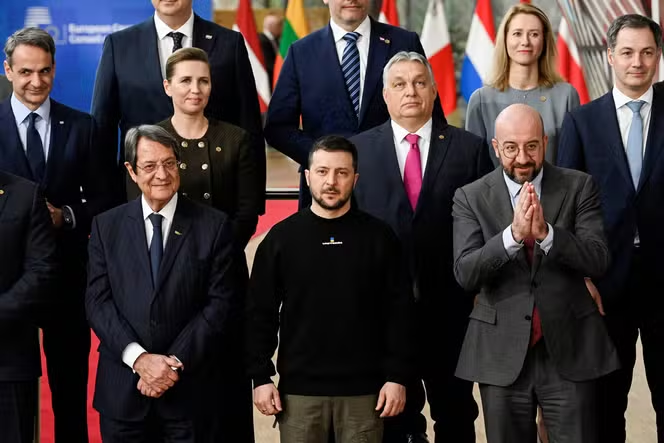In a powerful display of unity and support, the leaders of Britain, France, Germany, and Poland met with Ukrainian President Volodymyr Zelenskiy in Kyiv on Saturday, just a day after Russian President Vladimir Putin hosted allies at Moscow’s Victory Day parade.
The visit marks the first time the leaders of all four nations have traveled together to Ukraine amid the ongoing war.
The summit comes at a critical diplomatic juncture as Ukraine and its Western allies push for an immediate, unconditional 30-day ceasefire—covering land, air, and sea—to open the door for serious peace negotiations with Moscow.

During their visit, British Prime Minister Keir Starmer, French President Emmanuel Macron, German Chancellor Friedrich Merz, and Polish Prime Minister Donald Tusk held a joint call with U.S. President Donald Trump to coordinate efforts on the proposed ceasefire.
READ ALSO: Pakistan Launches Fattah-1 Missiles and Suicide Drones at Indian Cities
Ukrainian Foreign Minister Andrii Sybiha confirmed the development on X (formerly Twitter), posting a photo of the five leaders huddled in deep discussion. “Ukraine and all allies are ready for a full unconditional ceasefire… starting already on Monday,” he wrote.

The leaders arrived via train dubbed the “Bravery Express,” a symbolic touch underscoring their solidarity. Upon arrival, they joined President Zelenskiy in laying wreaths at a Kyiv memorial dedicated to Ukrainian soldiers killed in the war.
READ ALSO: Trump Announces Full Ceasefire Between India and Pakistan After U.S.-Brokered Talks
A French diplomatic source revealed ahead of the meeting that the leaders were expected to discuss a U.S.-EU ceasefire proposal. If Russia rejects the plan, new coordinated sanctions are likely to follow.
President Trump, now months into his second term, has taken a different approach to the war compared to his predecessor. After early missteps—including a brief freeze on military aid—Trump has since repaired diplomatic ties with Kyiv and signed a critical deal on Ukraine’s mineral resources.

His administration has become increasingly vocal about Russia’s delay in accepting peace terms. “We want a ceasefire, but if Moscow keeps stalling, we’re ready to escalate pressure,” Trump warned earlier this week. He’s urged for a 30-day ceasefire, which Zelenskiy has publicly backed.
Moscow’s response remains cautious. Kremlin spokesman Dmitry Peskov said Russia could support a ceasefire but only if certain “nuances” are respected. In an interview with ABC, Peskov hinted that Western military aid to Ukraine must stop for any temporary truce to be acceptable to the Kremlin—otherwise, he claimed, it would give Ukraine an advantage.

Since Russia’s full-scale invasion in February 2022, Western military support has been essential to Ukraine’s ability to hold its ground. Any pause in aid would drastically shift the conflict dynamics.
As diplomatic channels remain tense and unpredictable, the next 48 hours could be pivotal. If the ceasefire plan takes hold, it could pave the way for longer-term negotiations. If it fails, a new wave of sanctions—and potentially deeper conflict—could follow.
Discover more from Scoop Hub
Subscribe to get the latest posts sent to your email.

